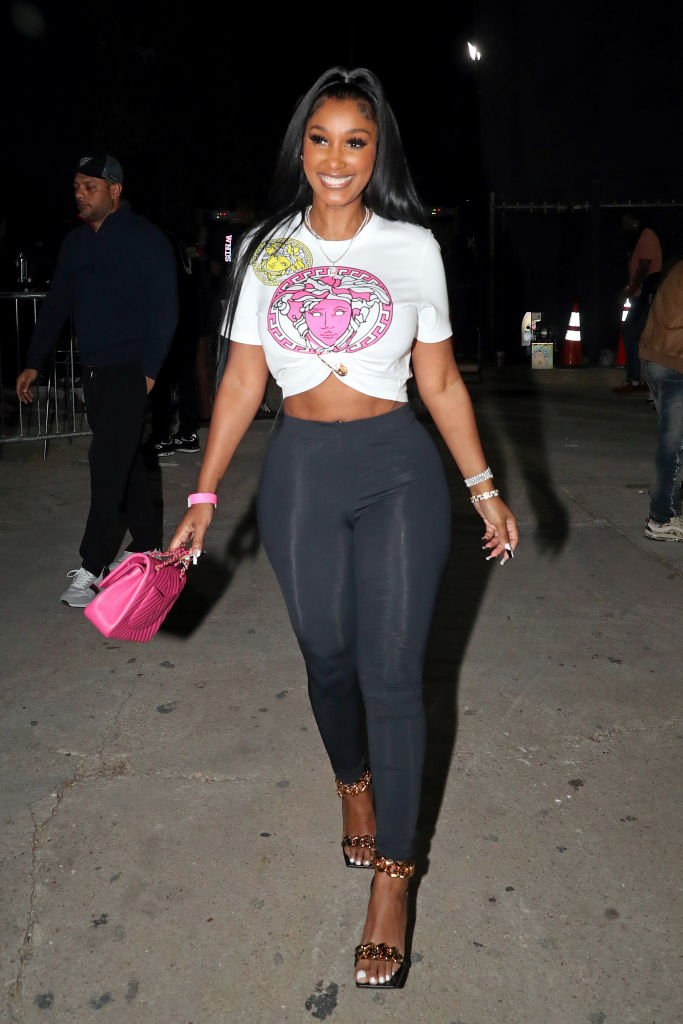
Source: Johnny Nunez / Getty
Bernice Burgos and her adult daughter shared a moment where the two shapely women shook their ass to Mystikal’s “Shake It Fast.” The mother-daughter duo were participating in the recent TikTok trend to the New Orleans rapper’s music. Burgos’s daughter twerked to the infectious beat while her mother playfully scolds her and—according to the song’s lyrics—advises her to “watch ya’ self/don’t get beside ya’ self.” Burgos pats her daughter on the butt and encourages to “go ‘head though/bounce them … shake that, stay in line, though.” Again, playfully acting out the song’s lyrics.
It is an endearing video that depicts a healthy, fun-loving, mother-daughter relationship—the type I wished I had with my own mother who passed away in 2018. Yet, when this video circulated on other Instagram platforms, it became clear that many people did not share my sentiment. The comments sections revealed just how many vehemently disagreed with me. Unsurprisingly, quite a few sat atop some really high horses and in the name of respectability, spewed rhetoric about raising their daughters to be ladies. On the Onsite! Instagram platform, one user commented, “How to Pimp Your Daughter 101…” hinting that Burgos was prostituting her child. Another user spoke about the inappropriateness of booty-shaking, particularly around your mother.
Listen, Black women and girls have been winding our waistlines long before they brought our Black asses over to this Western Hemisphere, but that’s a conversation for another day. The harsh critique of Burgos’s parenting came with the typical age-old oppression projected onto young Black girls, particularly the comment where a mother alluded to not being one of their daughters’ “little friends.” It made me think of the often complicated mother-daughter dynamics–and more specifically my relationship with my own mother.
As young as 8-years-old, my mother often commented on my developing body. She constantly reminded me that I had inherited my grandmother’s curves. And for her, this was problematic. Well before I hit puberty, I received the message that my body was something that needed to be controlled which meant my love for dance and gymnastics was something I could no longer participate in. To Dorothy, the leotards and the ways in which I naturally moved my body were “risqué.” My requests for clothes that were in fashion were often met with an angry no and accusations of being “too grown.” My mother thought I was trying to put my body on display when all I wanted to do was dress like Denise Huxtible. My then-stepmother shared the same attitude. When I was 10-years-old, she caught me dancing and referred to me as “hot in the pants.”
In their defense, strictness was their idea of protecting me because history has shown us nobody else will. But what I perceived from their anger toward my body and its movement caused shame and confusion. I was “fast” before I even liked boys and “too grown” when I still enjoyed Saturday morning cartoons. My once confident and animated self, who loved to perform song and dance for audiences, became incredibly insecure, angry and reserved. I danced in secret. I resented my mother for most of my teenage years because in my mind she was angry with me for simply being. It seemed like my mother’s number one priority was to prevent me from becoming a whore. Remaining chaste took precedence over my dreams, my feelings, my mental health and my natural desires to explore sexuality.
Spoiler alert– no amount of covering up curves and prohibiting ass shaking is going to stop predators from being predators. They were in our schools, churches and our neighborhoods. Myself and other young scolded but vulnerable girls were afraid to talk to our mothers. We relied on one another, though, none of us were wholly equipped to give each other the guidance and protection that we needed. Still, we told each other which streets to avoid, and whose brothers, daddies and uncles were living foul. No amount of slut shaming and fear mongering stopped us from sneaking mini skirts into our bookbags and boys into our bedroom windows. It simply taught us to become experts in hiding hickies and pregnant bellies like generations of women who preceded us.
I often imagine how different my formative years would have been if my mother was free to be her authentic self around me and with me and allowed me to be the same. What possibilities might exist if instead of fearing my mother’s wrath, I felt comfortable, free and safe in her presence? If that were my reality, I would not have spent years shrinking myself in the presence of people’s judgement. It would have taken me this long to get to the place where I am today–a woman who is free-spirited and gives zero fucks about social norms that dictate women’s access and liberty. I have long since forgiven my mother because I know she was parenting/protecting me in the best way that she knew, in the fearful way that was handed down to her.
Those comments about Burgos angered me but I readjusted and now feel empathy. Many of these women were raised as I was, where your momma is not supposed to be one of your “little friends.” It is incredibly sad because many of us little Black girls needed a friend in our mothers. Friendship and parental respect can exist in the same space. Joyful moments with your mom (even those that include twerking) should be the norm and not the exception.
Surely, I’m not suggesting everyone have twerk fests with their mom, but it is time we ask ourselves why so many of us are so comfortable with policing our daughters (and other women) with dated respectability politics that are rooted in internalized misogyny.


